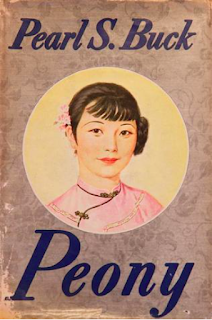 |
| Already a contender for Prettiest Book Cover of the Year |
I'm still really trying to read as many books as possible this year from my own shelves. I made a pile of books that I could count towards the Back to the Classics Challenge, and one of them was Peony by Pearl S. Buck that I received as a Christmas gift several years ago. I really liked The Good Earth; also, I'm really enamored of all the beautiful covers of Buck's novels that were published a few years ago by Moyer-Bell. I think they're out of print now but most of them are still reasonably priced.
Published in 1948, Peony is set approximately 100 years earlier. It's the story of a young bondwoman who was adopted/indentured from an orphanage to a Jewish merchant family living in Kaifeng. At the beginning of the story, Peony is about 17 and is in love with the only child of the household, the handsome David who has been unofficially betrothed since infancy to Leah, daughter of the rabbi.
David's mother is pushing the match but David's father Ezra, who is half-Chinese (by his late father's concubine) is less concerned. David thinks he is in love with Kuelan, whom he's never actually met but is the daughter of successful Chinese merchant. Ezra realizes this would be a strategic business move. Meanwhile, Peony has to hide her love for David, realizing he can never marry her, but she begins to manipulate the situation so that she can guarantee a place in the house as long as possible.
David is torn between pleasing his other and marrying Leah, whom he likes but doesn't love, and following his own heart and marrying Kuelan. He's also torn between his Jewish faith and continuing the family heritage, or assimilating further into the Chinese culture that has welcomed his family. There is mention of atrocities done to Jews in other lands, particularly Palestine, and there may also have been pogroms at that time period to which they are referring. Meanwhile, Peony doesn't have many choices as a bondwoman -- I'm really not sure if she ever had the ability to leave the house or if she was actual chattel.
The best parts of Peony are the descriptions of life in China. Pearl Buck really knew her subject, but I don't think lyrical writing is really her strong point, compared to Graham Greene which was my previous read. The dialogue in particular is pretty stiff. And the character development in this book is really not great. In particular, Leah has very little character development except for being Beautiful and Good, plus some other throwaway characters and mustache-twirling villains with little or no explanation.
However, the book has a really interesting premise -- I knew there were ethnic Muslims in China, but I didn't know about the history of the Jews. It was actually really refreshing to read about Jews who weren't being persecuted and were accepted. Overall, I think it was either too short or overly ambitious. There were a lot of unresolved storylines and characters that weren't especially developed, and the ending seemed pretty rushed -- Buck basically wrapped up years of family history (and the Jewish population of Kaifeng) in just one or two chapters at the end. I almost feel like either it should have been longer, or she should have narrowed the focus.
 |
| The original 1948 cover. The asymmetrical hair is making my eyes twitch, but that's how it's described in the book. |
Buck did base the story of the Kaifeng Jews on historical research, and my edition did have some really interesting end notes with the history. I also own East Wind, West Wind in a Moyer-Bell edition, plus a couple of her other novels in mid-century editions -- you can find them pretty cheaply at used bookstores and library sales. I think I have Imperial Woman, The Living Reed and The Three Daughters of Madame Liang. Hopefully I'll get to one of them in May for Asian-Pacific Heritage month.
I'm counting this as my Classic with a Single-Word Title for the Back to the Classics Challenge.

never read any P Buck
ReplyDeletethis sounds interesting
I really liked the parts describing China, and I thought she did a good job with David and his inner conflict about not belonging to one culture or the other. It was interesting.
DeleteNo one reads Pearl S. Buck much any more, have you noticed? I've only ever read The Living Reed by her, but I liked it and I learned a lot about Korea from it. :)
ReplyDeleteYes, nobody reads her any more. But I've read The Good Earth with three different book groups and it was universally loved by all three, with really good attendance for each group. That's the only one of her books that seems to get any attention. I haven't read The Living Reed but I do own it, I think it will be my next read from her books. I know next to nothing about Korea.
DeleteI read the Good Earth in high school and I was very impressed. Never went on to read anything else by Pearl Buck though and I would like to change that and Peony sounds like a good place to start.
ReplyDeleteI loved The Good Earth, there are two sequels which I've never read either. I did read Pavilion of Women with another group (simply because the library had enough copies) and we liked that one also. Pearl Buck was very prolific and I think she wrote about 40 novels, mostly about China.
ReplyDeleteI read a Pearl S Buck a little while ago after around 40 years! it did not have the same impact on me now unlike then. I like the history lessons which are so real but the emotional impact of the story was much less.
ReplyDeleteI agree, I think the history and culture are the strongest parts of her writing.
Delete